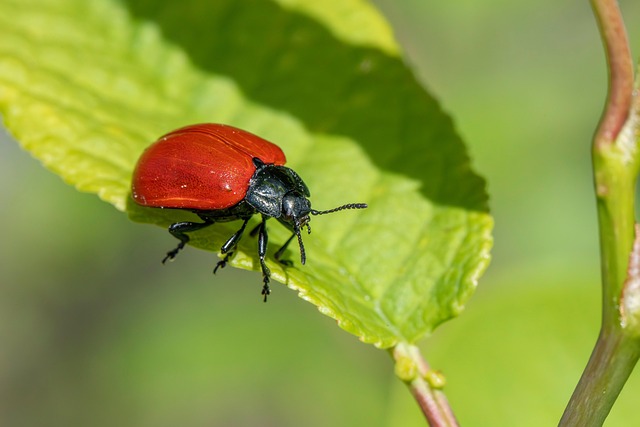Sheridan uses Integrated Pest Management (IPM) for residential mosquito control to prevent West Nile virus, a disease spread by mosquitoes. This approach combines habitat manipulation (removing standing water), biological controls, and targeted applications of approved insecticides only when needed. By focusing on long-term solutions, IPM protects public health while minimizing disruptions to outdoor activities and ensuring a safe, healthy environment for residents.
Integrated Pest Management (IPM) offers a holistic approach to pest control, particularly effective for managing mosquito populations. This article explores how residential mosquito control plays a pivotal role in preventing the spread of diseases like West Nile Virus in Sheridan. We delve into successful IPM strategies, highlighting their environmental benefits and cost-effectiveness. By understanding these methods, residents can actively contribute to a safer, healthier community while mitigating the risks associated with traditional pest management practices.
- Understanding Integrated Pest Management (IPM) for Mosquito Control
- The Role of Residential Mosquito Control in Preventing West Nile Virus
- Effective Strategies and Benefits of IPM in Sheridan
Understanding Integrated Pest Management (IPM) for Mosquito Control

Integrated Pest Management (IPM) for mosquito control is a comprehensive approach that combines various strategies to manage and reduce mosquito populations effectively. In residential areas like Sheridan, where preventing the spread of diseases such as West Nile virus is paramount, IPM offers a sustainable and environmentally friendly solution. This method goes beyond traditional chemical sprays by emphasizing a balanced ecosystem where natural predators, habitat modification, and targeted treatments play equal roles.
By understanding the life cycles of mosquitoes and their environmental triggers, residents can participate actively in IPM. This includes removing standing water—a breeding ground for mosquitoes—from containers around homes, maintaining proper drainage, and planting mosquito-repelling plants. In cases where mosquito populations exceed manageable levels, targeted applications of approved pesticides can be part of the IPM strategy, ensuring that control measures are both safe and effective in protecting Sheridan’s residents from these disease vectors.
The Role of Residential Mosquito Control in Preventing West Nile Virus

In recent years, residential mosquito control has emerged as a vital strategy in the fight against the West Nile Virus (WNV) in areas like Sheridan. The presence of mosquitoes acts as a vector for transmitting WNV to humans and animals, making effective mosquito control a key preventive measure. By implementing tailored residential mosquito control programs, communities can significantly reduce the risk of WNV infection. These programs often involve targeted treatments, including the use of insecticides and biological controls, to eliminate or mitigate mosquito breeding grounds within residential areas.
In Sheridan, where mosquitoes are prevalent during certain seasons, proactive residential mosquito control measures play a crucial role in protecting public health. By addressing mosquito populations early and consistently, residents can enjoy reduced outdoor activity disruptions caused by these insects while also minimizing the potential for WNV transmission. Effective mosquito control not only provides peace of mind but is an essential component in maintaining a safe and healthy environment for Sheridan’s residents.
Effective Strategies and Benefits of IPM in Sheridan

In Sheridan, Integrated Pest Management (IPM) offers a comprehensive and effective approach to pest control, focusing on long-term solutions rather than quick fixes. This strategy involves a combination of techniques such as habitat manipulation, biological controls, and targeted chemical applications. By implementing IPM, residents can enjoy significant benefits, especially in the realm of residential mosquito control. One of the primary goals is to prevent the spread of diseases like West Nile virus, which has been a concern in the area.
Effective IPM strategies include identifying and eliminating standing water where mosquitoes breed, using mosquito traps to reduce their population, and applying environmentally friendly insecticides when necessary. These methods not only control mosquito populations but also minimize the potential harm to non-target organisms and the environment. As a result, Sheridan residents can experience a safer, healthier outdoor environment while enjoying the beauty of their surroundings without worrying about the negative impacts of pest management practices.
Integrated Pest Management (IPM) offers a comprehensive solution for mosquito control, particularly in residential areas like Sheridan. By combining various strategies, including biological controls, habitat manipulation, and targeted treatments, IPM effectively reduces mosquito populations without harmful chemicals. This approach not only minimizes environmental impact but also plays a crucial role in preventing the spread of diseases like West Nile Virus. Implementing these strategies ensures a safer, healthier living environment for Sheridan’s folks, fostering a vibrant and sustainable community.
